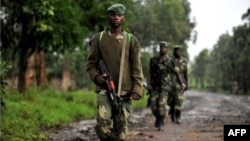PRETORIA, SOUTH AFRICA —
Congolese President Joseph Kabila and South African President Jacob Zuma held a bilateral meeting Tuesday that coincides with a rising rebellion in Congo's east. Despite the brewing crisis, the leaders' public comments were laudatory and optimistic.
The presidents of South Africa and the Democratic Republic of Congo could not have been more genteel when they met in front of journalists Tuesday in South Africa's capital, Pretoria.
South African President Jacob Zuma welcomed President Joseph Kabila. The young Congolese president replied in kind, and in mellifluous English.
Zuma praised economic and diplomatic cooperation between his nation, an African economic giant, and the large, mineral-rich Congo.
"Your excellency, I'm informed that noticeable progress has been reported on our joint projects," said Zuma. "In this regard it is important to acknowledge amongst others, the good work done in the field of capacity building within the DRC's national army and police, the public servants census and the training of diplomats."
What the presidents didn't talk about is perhaps more interesting.
Volatile eastern Congo is reeling from a recent upswing in violence. That violence comes at the hands of a group made up of former rebels turned army officers turned rebels again who reignited the conflict in May. The United Nations has said in a widely circulated confidential report that both neighboring Rwanda and Uganda are supporting the rebels. Both nations deny the charge.
Last week, Rwanda was elected to a rotating seat on the U.N. Security Council over the DRC's objection. The current occupant of that seat is South Africa. They'll hand off to Rwanda in January.
That leaves South Africa very little time to flex its muscle on the Council before Rwanda comes in.
On Monday, Congo's foreign minister Raymond Tshibanda directly asked South Africa for help, saying South Africa's participation in finding a solution is "for us, essential."
Kabila himself said very little on the subject.
"The challenges that we face are definitely huge, huge challenges, and the case in point is our own challenge in the east, in North Kivu," Kabila said.
Zuma also chose to praise Congo's 2011 elections, the first vote organized by the country itself.
"We are happy that those elections were successfully conducted in a peaceful environment and observed by regional and international observers," Zuma added. "Importantly, those elections assisted in strengthening democracy in the DRC."
That vote, however, was roundly condemned by observers, including the U.N., the European Union, the Carter Center and even the Congolese Catholic church. Kabila was announced the winner in December. Human Rights Watch says security forces then killed at least 24 people and detained dozens more, many of them opposition activists and supporters.
Perhaps the best assessment of the two presidents' markedly polite tone Tuesday came from a young South African official, who smiled like a sphinx when pressed by a journalist for more straight talk from the presidents.
The presidents of South Africa and the Democratic Republic of Congo could not have been more genteel when they met in front of journalists Tuesday in South Africa's capital, Pretoria.
South African President Jacob Zuma welcomed President Joseph Kabila. The young Congolese president replied in kind, and in mellifluous English.
Zuma praised economic and diplomatic cooperation between his nation, an African economic giant, and the large, mineral-rich Congo.
"Your excellency, I'm informed that noticeable progress has been reported on our joint projects," said Zuma. "In this regard it is important to acknowledge amongst others, the good work done in the field of capacity building within the DRC's national army and police, the public servants census and the training of diplomats."
What the presidents didn't talk about is perhaps more interesting.
Volatile eastern Congo is reeling from a recent upswing in violence. That violence comes at the hands of a group made up of former rebels turned army officers turned rebels again who reignited the conflict in May. The United Nations has said in a widely circulated confidential report that both neighboring Rwanda and Uganda are supporting the rebels. Both nations deny the charge.
Last week, Rwanda was elected to a rotating seat on the U.N. Security Council over the DRC's objection. The current occupant of that seat is South Africa. They'll hand off to Rwanda in January.
That leaves South Africa very little time to flex its muscle on the Council before Rwanda comes in.
On Monday, Congo's foreign minister Raymond Tshibanda directly asked South Africa for help, saying South Africa's participation in finding a solution is "for us, essential."
Kabila himself said very little on the subject.
"The challenges that we face are definitely huge, huge challenges, and the case in point is our own challenge in the east, in North Kivu," Kabila said.
Zuma also chose to praise Congo's 2011 elections, the first vote organized by the country itself.
"We are happy that those elections were successfully conducted in a peaceful environment and observed by regional and international observers," Zuma added. "Importantly, those elections assisted in strengthening democracy in the DRC."
That vote, however, was roundly condemned by observers, including the U.N., the European Union, the Carter Center and even the Congolese Catholic church. Kabila was announced the winner in December. Human Rights Watch says security forces then killed at least 24 people and detained dozens more, many of them opposition activists and supporters.
Perhaps the best assessment of the two presidents' markedly polite tone Tuesday came from a young South African official, who smiled like a sphinx when pressed by a journalist for more straight talk from the presidents.




